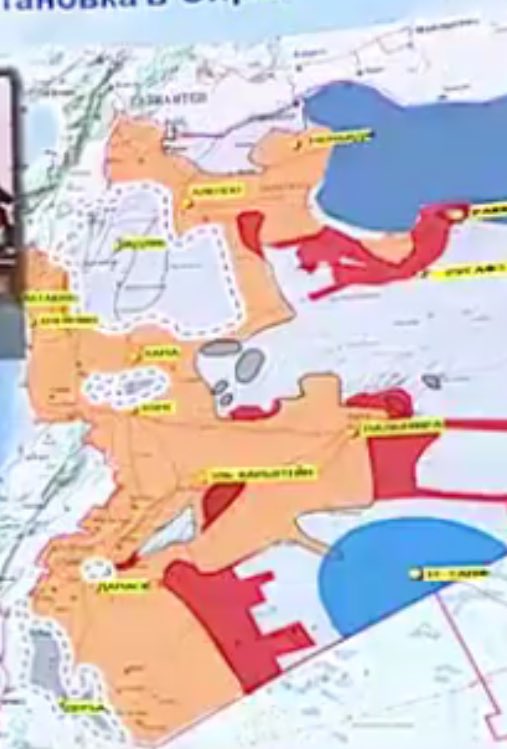
U.S. and Gulf Allies Supported Islamist Extremists in Syria
At least 40 civilians have been killed in airstrikes conducted by the US-Led Coalition on a community in Syria's Deir ez-Zor on Wednesday
Wandering the information superhighway, he came upon the last refuge of civilization, PoFo, the only forum on the internet ...
Moderator: PoFo Middle-East Mods

It could have many in Raqqa and still have its ass kicked by airstrike and SDF, and it can have relatively few near Tadmur and hold out against the SAA for a long time due to mountains or poor SAA units operating there.What I'm saying is that if you are ISIS and you find yourself in this situation, then however few troops you have in the desert is still too many and however many you have in Raqqa is still too few, so my point still stands.

Cancel military trade and/or strategic projects, impose sanctions on individuals and/or companies, as could other NATO countries.And that's for waging war on a terror affiliate with the consent of Syria's internationally-recognized government? It would take some PR gymnastics to even get this far, and this doesn't sound like very far at all. If I were Erdogan, I would find this an entirely acceptable price to pay for crushing YPG. You really think that would scare him shitless, scare him MORE than what Russia could do?

What do you think Russia would do, start a war with Turkey if it took over Manbij or Tall Abyad?Direct war is unlikely (though not ruled out completely), but a hybrid war/cold war is quite possible, and it could be absolutely ruinous for Turkey. Starting by shipping arms and supplies to YPG (and its Turkish affiliate by extension) in large quantities, apply pressure internationally (such as increase arms race in Cyprus for example), and try to otherwise undermine, financially strangle, and sabotage the Turkish government by any means available - that's something Russia could actually do if it felt like Turkey really crossed a red line.
It has literally invaded the country with rebels that are far more hostile to the government, with the government and Russia's blessing.I'm not sure what point you're trying to make here, could you kindly rephrase?
It could have also kicked YPG's ass when they connected the cantons and all the way until the Russian intervention in 2015, YPG was already a major force by summer o that year.





At this point, the adviser said, the president’s national security planners were more than a little rattled: “No one knew the provenance of the photographs. We didn’t know who the children were or how they got hurt. Sarin actually is very easy to detect because it penetrates paint, and all one would have to do is get a paint sample. We knew there was a cloud and we knew it hurt people. But you cannot jump from there to certainty that Assad had hidden sarin from the UN because he wanted to use it in Khan Sheikhoun.” The intelligence made clear that a Syrian Air Force SU-24 fighter bomber had used a conventional weapon to hit its target: There had been no chemical warhead. And yet it was impossible for the experts to persuade the president of this once he had made up his mind. “The president saw the photographs of poisoned little girls and said it was an Assad atrocity,” the senior adviser said. “It’s typical of human nature. You jump to the conclusion you want. Intelligence analysts do not argue with a president. They’re not going to tell the president, ‘if you interpret the data this way, I quit.’”
“The boss knew before the meeting that they didn’t have the intelligence, but that was not the issue,” the adviser said. “The meeting was about, ‘Here’s what I’m going to do,' and then he gets the options.”


Half a million Syrians return home as Syrian gov’t & allies liberate more areas
According to the UN Refugee Agency, almost half a million Syrians have returned back to their homes this year. This includes an estimated 440,000 internally displaced people and 31 ,000 from neighboring countries. Also according to UNHCR figures, since 2015 more than 260,000 refugees returned back to northern Syria, mainly from neighboring Turkey.
Based on U.N. reports, people are returning to Aleppo, Hama, Homs and Damascus. These are cities that have either always been under Syrian government control, such as Damascus, or others that have recently been liberated, such as Aleppo in December 2016, Hama in April, and Homs in May.
Speaking in a news briefing in Geneva on June 30, UNHCR spokeswoman Andrej Mahecic said, “This is a significant trend and a significant number.”
https://www.liberationnews.org/almost-h ... ore-areas/
And now we get from the CIA themselves a "hypothesis" that it was a "high probability"The word "hypothesis" means a "starting point for further investigation", without saying anything of its results. "High probability" (to be precise he said "high confidence") could be anywhere from 80% to 100%, which would under normal circumstances justify action. So I have no idea what revolutionary new knowledge you've managed to squeeze out of that fairly ordinary statement.







skinster wrote:It seems to bother you that Israel aids terrorist orgs in Syria, and ISIS too. More information about that here.
Apologies but the news is the news. I am merely the messenger. Don't shoot me. The truth remains the truth even if I don't tell it.

The Golan Heights is occupied territory, belonging to Syria.
@Verv "a certain issue" Passing w[…]
Zionists and others who support the way Israel is[…]